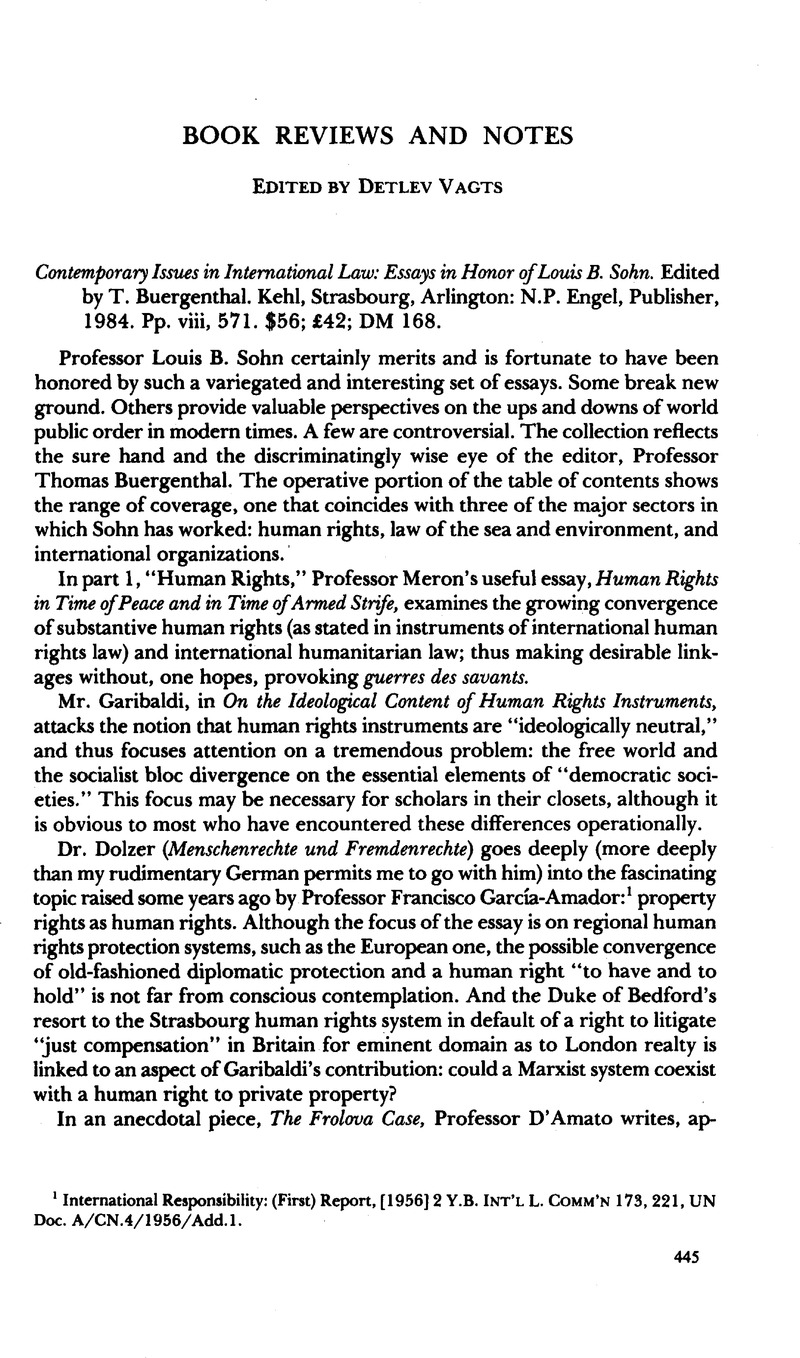No CrossRef data available.
Article contents
Contemporary Issues in International Law: Essays in Honor of Louis B. Sohn. Edited by T. Buergenthal. Kehl, Strasbourg, Arlington: N.P. Engel, Publisher, 1984. Pp. viii, 571. $56; £42; DM 168.
Published online by Cambridge University Press: 27 February 2017
Abstract

- Type
- Book Reviews and Notes
- Information
- Copyright
- Copyright © American Society of International Law 1987
References
1 International Responsibility: (First) Report, [1956] 2 Y.B. Int’l L. Comm’n 173, 221, UN Doc. A/CN.4/1956/Add.1.
2 28 U.S.C. § 1605(a)(5) (1982).
3 The tightening of FRCP Rule 11 in recent years has prompted both activity in bar association and law-improvement circles and some public comment, N.Y. Times, Oct. 2, 1986, at A25, co1. 2.
4 The writer did not say whether dismissal preceded or followed the Soviet Union’s release of the bridegroom.
5 Especially since the disposition of a suit that divided human rights activists on the advisability of its being brought in an American court, Tel-Oren v. Libyan Arab Republic, 726 F.2d 774 (D.C. Cir. 1984), and the extraordinary default judgment in Von Dardel v. Union of Soviet Socialist Republics, 623 F.Supp. 246 (D.D.C. 1985), summarized in 80 AJIL 177 (1986), which will not be reviewed due to the continued abstention of the respondent. In this latter instance, D’Amato and his associated counsel, far from being sanctioned under Rule 11 as some had feared, won by an implausible combination of the FSIA and the Alien Tort Statute (28 U.S.C. §1350 (1982)) to reach (as tortious) acts that began in Budapest, Hungary, during the later days of World War II, involving the detention and disappearance of Swedish diplomat Raoul Wallenberg. Nonetheless, whether the outcome will encourage wider resort by aliens to suits against foreign states for injuries localized abroad, despite the new teeth in Rule 11, is problematical. Cf. Johnson v. New York City Transit Authority, 639 F.Supp. 887 (E.D.N.Y. 1986), and a spate of cases listed cumulatively as of Oct. 6, 1986, under Rule 11 for 640 F.Supp.
6 Fauchille, , Draft Convention, Regime of Aerostats and Wireless Telegraphy 21 Annuaire de Droit International 293, 327 (1907)Google Scholar; Sweeney, J., Oliver, C. & Leech, N., The International Legal System 230–31 (2d ed. 1981)Google Scholar.
7 Among others, de Toqueville, Kennan, C. P. Snow. Cf. Oliver, , Reflections on Two Recent Developments Affecting the Function of Law in the International Community 30 Tex. L. Rev. 815, 833–34 (1952)Google Scholar.
8 Through upbringing, age, linguistic proficiency and cultural affinity.
9 Compare the lengthy and highly controversial apologia for Reagan administration policy in Central America, Moore, , The Secret War in Central America and the Future of World Order 80 AJIL 43 (1986)CrossRefGoogle Scholar, and the replies thereto now coming into print such as Rowles, “Secret Wars,” Self-Defense and the Charter—A Reply to Professor Moore, id. at 568. This note was rewritten on October 8, 1986, when further covert destabilizing action against Nicaragua, possibly linked to the United States, or involving failure of the Executive to enforce our neutrality and munitions export control laws was being reported. A new Black Legend for the likes of Lie. Díaz is in the making. Under the circumstances it is not possible to laugh Díaz off today with a reference to a well-known pragmatist’s (Sancho Panza’s) response to a rather famous Believer-in-Monsters: “But Sir! They are but windmills!”




